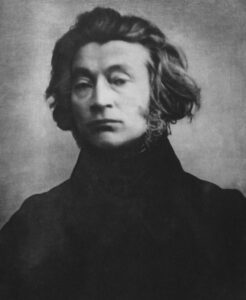Adam Mickiewicz is a Polish poet, political activist, publicist, translator, philosopher, religious activist, organizer and military commander and academic teacher. Next to Juliusz Słowacki and Zygmunt Krasinski, he is considered the greatest poet of Polish Romanticism and Polish literature. Mickiewicz is counted among the so-called Three Bards. He was an outstanding creator of romantic drama in Poland. Both in his homeland and in Western Europe, he was compared to Goethe and Byron. Mickiewicz is known primarily as the author of ballads, poetic novels, the drama Dziady and the national epic Pan Tadeusz. Mickiewicz was a national poet of Poland, Lithuania, and Belarus.
Adam Mickiewicz was born on December 24, 1798, in Novgorod (a city in Belarus). He was the son of Mikołaj Mickiewicz of the Poraj coat of arms, a court lawyer in Nowogrodek and a Minsk bailiff, and Barbara née Majewski, daughter of an economist from nearby Czombrow. His brothers were Aleksander and Franciszek Bronisław Mickiewicz. In the years 1807-1815 he attended the Dominican district school in Novgorod. In 1812, he fell seriously ill, his father died, and Napoleonic troops marching on Russia passed through Novgorod.
In 1815, Mickiewicz went to study in Vilnius, where he studied humanities at the Imperial University of Vilnius – the leading university for the lands of the Republic of Poland taken over by the Russian Empire. Mickiewicz undertook studies at the Faculty of Physical and Mathematical Sciences, at the same time attending lectures of the Faculty of Moral and Political Sciences and Literature and Liberal Arts. His difficult financial situation forced him to study at the University Teachers’ Seminary, which later guaranteed employment in tsarist schools. He graduated in 1819 with a master’s degree.

During his studies, Mickiewicz, together with Tomasz Zan and a group of friends, founded the Philomatic Society, which over time transformed into a conspiratorial national-patriotic organization. The main task of the organization was educational and patriotic work, which was aimed at shaping the Polish youth of Vilnius of that period. During his studies, Mickiewicz, together with Tomasz Zan and a group of friends, founded the Philomatic Society, which over time transformed into a conspiratorial national-patriotic organization. The main task of the organization was educational and patriotic work, which was aimed at shaping the Polish youth of Vilnius of that period.
In 1819 Mickiewicz began working as a teacher at the gymnasium in Kaunas, where he lived until 1823. Mickiewicz was a member of Freemasonry, initially with the rank of journeyman. In 1823, he was arrested and imprisoned in the Basilian monastery in Vilnius, and then he was sentenced to exile deep into Russia for a teacher position for participation in secret youth organizations. Mickiewicz could choose a location. He stayed in St. Petersburg, Odessa, Moscow and Crimea. He maintained contacts with Russian poets such as Alexander Pushkin, Alexei Khomyakov and Vasily Zhukovsky.
The whole period of patriotic youth of Vilnius-Kaunas resulted in Dziady cz. III. Mickiewicz then traveled around Europe. He visited Germany, Italy and Switzerland. He also went to the kingdom of Poland, which was overwhelmed by the rebellion, but eventually Mickiewicz remained in Dresden until 1832. From Dresden he went to Paris, where he settled permanently. He was a member of the Lithuanian Society and the Ruthenian Lands in Paris. He also married Celina Szymanowska, with whom he had six children.
In 1855, during the Crimean War, Mickiewicz went to Istanbul to form Polish troops, as well as the Jewish Legion composed of Jews to fight Tsarist Russia. Mickiewicz died suddenly in Istanbul during a cholera epidemic. After his death, Mickiewicz was laid to rest in France, and on July 4, 1890, his body was transferred to Wawel.
